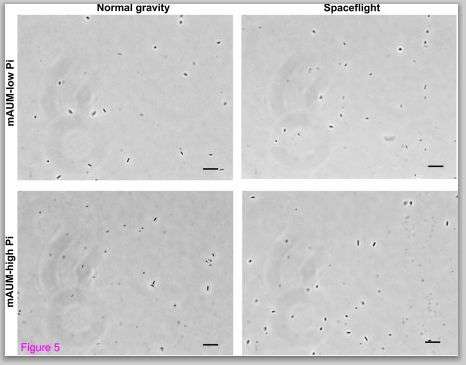November 8, 2013 report
Researchers discover bacteria thrive in zero-gravity low nutrient environment

(Phys.org) —A team of researchers at Rensselaer Polytechnic Institute, in New York, working with Lockheed-Martin Ames Research Center has found that one strain of a common type of bacteria thrives aboard space vehicles, even when faced with minimal nutrients. In their paper published in BMC Microbiology, the researchers describe an experiment they conducted aboard NASA Shuttle Atlantis that showed that Pseudomonas aeruginosa, a very common type of bacteria, grows more dense cultures when in space than it does on Earth when available nutrients are restricted.
P. aeruginosa, is one of the strains of bacteria responsible for urinary tract and other types of infections in people. The researchers chose it to study as a means of learning more about the ways bacteria that actually infect people might behave in a zero-gravity environment. Such research is important as space agencies contemplate longer missions at much farther distances.
In this latest effort, the researchers added the bacteria to several containers of simulated urine that were put aboard one of the last Shuttle missions—each with a different mix of nutrients and amount of bacteria. Astronauts aboard the shuttle were able to monitor bacterial growth as were researchers on the team after the samples were brought back home.
In analyzing the results, the researchers found that after 72 hours when fed an abundance of nutrients P. aeruginosa concentrations in space were nearly identical to those of Earth-bound samples. But, when the nutrients were greatly reduced, the researchers found that the bacteria in space kept up the same pace—concentrations of the bacteria were nearly the same as those that had been given a lot of nutrients. Those bacteria in the lab back on Earth, on the other hand, when fed the same small amount, showed far less growth.
The study indicates that scientists designing systems to protect future astronauts against bacterial infections, headed for places like Mars, may have their hands full. P. aeruginosais is a type of bacteria that could very easily infect human waste processing systems. Also getting rid of such colonies would be difficult as they are notoriously difficult to eradicate here on Earth. Now that it's known they can thrive with even fewer available nutrients, the problem becomes even harder to solve.
More information: Effect of spaceflight on Pseudomonas aeruginosa final cell density is modulated by nutrient and oxygen availability, BMC Microbiology 2013, 13:241. DOI: 10.1186/1471-2180-13-241
Journal information: BMC Microbiology
© 2013 Phys.org




















